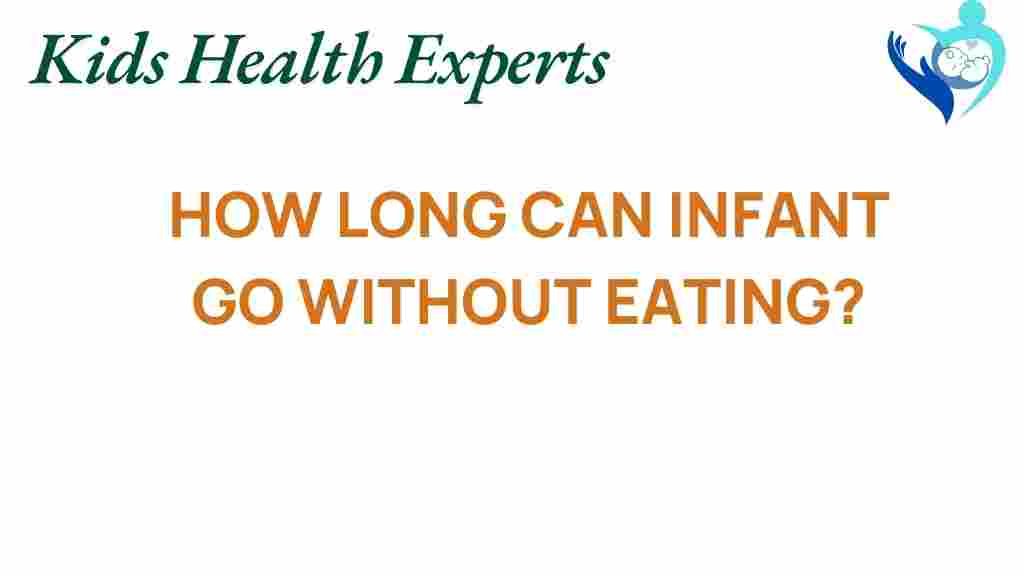How Long Can Infants Safely Go Without Eating? Exploring Infant Feeding
As new parents, understanding infant feeding is crucial for ensuring the health and well-being of your newborn. One common concern that arises is how long an infant can safely go without eating. This article will delve into important aspects of infant nutrition, hunger cues, and pediatric advice to help you navigate this essential part of newborn care.
Feeding practices can significantly impact infant health and development. In this article, we’ll cover the following topics:
- Understanding infant hunger cues
- Recommended feeding schedules for newborns
- The importance of nutrition in infant development
- How to respond to your baby’s feeding needs
- Troubleshooting feeding issues
Understanding Infant Hunger Cues
Recognizing hunger cues is vital in establishing a successful feeding schedule. Infants are born with natural instincts that signal when they are hungry. Some common hunger cues include:
- Rooting reflex: When the baby turns their head and opens their mouth, searching for something to suck on.
- Hand-to-mouth movement: Babies may start to bring their hands to their mouths when they are hungry.
- Increased alertness: A hungry baby may become more alert and active, making more eye contact.
- Crying: This is often a late hunger cue, indicating the baby is very hungry.
Learning to recognize these cues can help you respond promptly to your baby’s needs, ensuring they receive adequate nutrition.
Recommended Feeding Schedules for Newborns
Newborns typically feed every 2 to 3 hours, but this can vary based on individual needs. Here’s a general guideline:
- 0-2 months: Newborns usually require 8 to 12 feedings per day, which translates to about every 2-3 hours.
- 2-4 months: As infants grow, they may begin to stretch out their feedings to every 3 to 4 hours.
- 4-6 months: Many infants will adapt to a more predictable feeding schedule, often feeding every 4 hours.
It’s important to note that every baby is unique, and feeding schedules can vary. Consulting with a pediatrician can provide tailored advice based on your baby’s specific needs.
The Importance of Nutrition in Infant Development
Proper nutrition is crucial for infant health. Breastfeeding is recommended as the primary source of nutrition for the first six months of life, providing essential nutrients and antibodies that help support the baby’s immune system and overall growth. If breastfeeding is not possible, infant formula is a suitable alternative.
During the early months of life, an infant’s stomach is small, and they require frequent feedings to meet their nutritional needs. Here are some key nutrients to focus on:
- Protein: Important for growth and development.
- Fat: Provides energy and supports brain development.
- Vitamins and minerals: Crucial for overall health, including vitamin D and iron.
For more information on infant nutrition, you can visit the American Academy of Pediatrics.
How to Respond to Your Baby’s Feeding Needs
As a caregiver, it’s essential to be responsive to your baby’s hunger cues. Here’s how you can effectively respond:
- Watch for hunger cues: As previously mentioned, recognizing these signs early can prevent excessive crying.
- Feed on demand: Allow your baby to dictate their feeding schedule. This promotes better breastfeeding and bonding.
- Stay calm and patient: If your baby is fussy or refuses to eat, try to soothe them before offering to feed again.
By following these steps, you can help ensure that your baby receives the nourishment they need for healthy development.
Troubleshooting Feeding Issues
Sometimes, you may encounter challenges regarding infant feeding. Here are some common issues and how to address them:
- Refusal to eat: If your baby refuses to eat, ensure that they are not too tired or overstimulated. Try feeding in a quiet, calm environment.
- Frequent crying: If your baby is crying consistently, it could indicate hunger or discomfort. Check for signs of hunger or any other needs.
- Weight concerns: If you suspect your baby isn’t gaining weight appropriately, consult your pediatrician for guidance.
Consulting your pediatrician is always advisable for personalized advice and to address any concerns about your baby’s feeding habits.
How Long Can Infants Safely Go Without Eating?
Most newborns will not go more than 4-5 hours without eating during the day, as they require frequent feedings due to their rapid growth. However, during the night, some infants may sleep longer stretches, especially if they are older than a couple of months.
Here are some general guidelines:
- Newborns (0-2 months): Should not go more than 4 hours without feeding, even at night.
- 2-4 months: They may begin to sleep longer at night, but daytime feedings should still occur every 3-4 hours.
- 4-6 months: Many infants can go longer stretches at night, but still need regular feedings during the day.
It’s vital to ensure that the baby is getting enough nutrition and hydration, especially during the first month of life.
Conclusion
Understanding how long infants can safely go without eating is an essential aspect of newborn care. By recognizing hunger cues, establishing a feeding schedule, and ensuring proper nutrition, you can support your baby’s health and development. Remember, every baby is unique, and consulting with a pediatrician can provide additional guidance tailored to your infant’s specific needs.
For more insights on feeding schedules and infant health, consider checking out our article on nurturing your newborn’s growth. With the right information and support, you can confidently navigate the early stages of your baby’s life.
This article is in the category Nutrition and created by KidsHealthExperts Team
